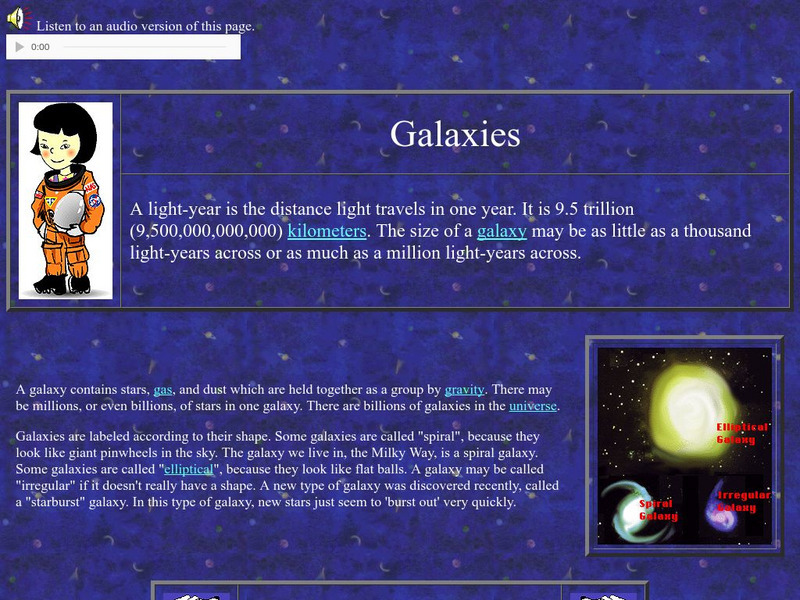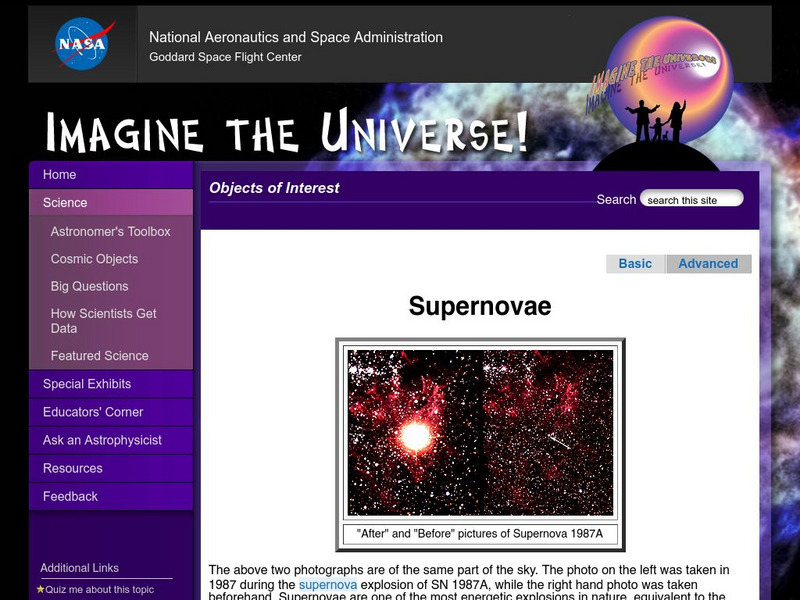Globio
Glossopedia: Stars
Many of the objects you can see in the night sky are stars, large objects in space that produce light. Our galaxy, the Milky Way, contains more than 100 billion stars. Stars are so far away that their light does not reach us for years....
Other
Sky Server: Types of Stars
SkyServer of the Sloan Digital Sky Survey shows you the different types of stars as well as how to classify and identify them.
NASA
Nasa: Imagine the Universe: How Big Is That Star
This 2-5 day lesson plan investigates the diameter, radius and mass among several stars in order to understand stellar behavior, particularly in a binary system.
CK-12 Foundation
Ck 12: Earth Science: Star Clusters
[Free Registration/Login may be required to access all resource tools.] Examines the two main types of star clusters.
Khan Academy
Khan Academy: Gallery: Stars
Get a view of all types of stars in this gallery. Learn about the life and death of stars in this gallery too.
Cosmos 4 kids
Cosmos4 Kids: Stars
A great site to find general information on stars and their place in the universe. Click on the topics on the right margin for additional information about stars.
PBS
Pbs Learning Media: Birth of a Supernova, Type Ii
In this interactive activity from NOVA Online, learn about a type of exploding star a Type II supernova that is so large it has a mass 10 times greater than the mass of our Sun.
PBS
Pbs Learning Media: Birth of a Supernova, Type Ia
In this interactive activity from NOVA Online, learn about a type of exploding star - a Type Ia supernova - that is so bright that astronomers can measure the distance to the galaxy in which it resides, and even learn which elements make...
BBC
Bbc: Stars
Use this site to explore how stars are born and die. There are also sections on star types and chemistry inside stars.
CK-12 Foundation
Ck 12: Life Science: Types of Echinoderms
[Free Registration/Login may be required to access all resource tools.] Birds aren't the only creatures that have feathers. One type of echinoderm, the feather star, has feathery arms. These animals don't fly or even move much at all....
Other
All Star: History of Aeronautics: Level 1
A history of aeronautics focusing on the major types of air travel for each major time period. Excellent pictures are included in most sections. Easier reading is available by clicking on Level 2 or 3.
NASA
Nasa Star Child: Galaxies
This resource has two levels: one for younger viewers and one for older viewers. It surveys the basic galaxy types and provides details.
John Wiley & Sons
Wiley: Physical Geography: Animation: Types of Dunes
A graphic compares different types of dunes in terms of the presence of three parameters: wind, sand, and vegetation. Clicking an example reveals a photo and a sentence about the dune formation.
NASA
Nasa Star Child: Quasars (Level 2) Information
NASA presents the amount of energy, type of energy, brightness, and the detection of quasars. Provides several examples, pictures, and information.
Other
Jack Horkheimer: Star Gazer
This is a site on astronomy in general. If you are into astrophotography, you can find out what is happening in the heavens! Jack Horkheimer is also seen on PBS. You can access the 5 or 1 minute shows on this site.
Minerals Ed
Minerals Ed: Rock Star 101 [Pdf]
This lesson takes you through the basic introduction of rocks. It includes information about the rock cycle and the three types of rocks: igneous, metamorphic and sedimentary.
Other
University of Leicester: Irregular Galaxies
Provides a general overview of irregular galaxies, including a specific look at type I and type II irregulars.
Other
University of Leicester: Comets, Asteroids & Meteorites
Provides a general overview of comets, asteroids, and meteorites. Content includes ways to identify them in the night sky, as well as detailed information on each type of small body.
Ministerio de Educación (Spain)
Ministerio De Educacion: Estrellas Binarias Modulo v Unidad 1
In this module you will learn the different types of binary stars.
NASA
Nasa Star Child: Galaxies (Level 1)
This site provides an introduction to galaxies for the younger student, that is divided into 2 levels of understanding. Find out what type of galaxy looks like a giant pinwheel. Audio content included. Good glossary, and a printable...
Space Telescope Science Institute
Amazing Space: Star Light Star Bright: Electromagnetic Radiation
Use this tool to learn facts about the range of the electromagnetic spectrum, from radio waves to gamma rays.
Other
Five Main Types of Graphic Organizers
This site provides information on how to use each graphic organizer. There are also 21 different graphic organizers for you to see.
Other
Catching the Light: Astrophotography
Author and astrophotographer, Jerry Lodriguss, offers up tips, techniques and various images that he's taken both with and without the use of digital enhancement. An amazing amount of detail is provided to explain his approach towards...
NASA
Nasa: Imagine the Universe: Supernovae (Advanced)
Supernovae are divided into two basic physical types, including a description of supernova types and how they are classified based on the existence of hydrogen spectral lines. Definitions of key terms are provided.
Other popular searches
- Different Types of Stars
- Differant Types of Stars
- Types of Stars Universe
- Types of Stars 3d
- Differ Ant Types of Stars



















